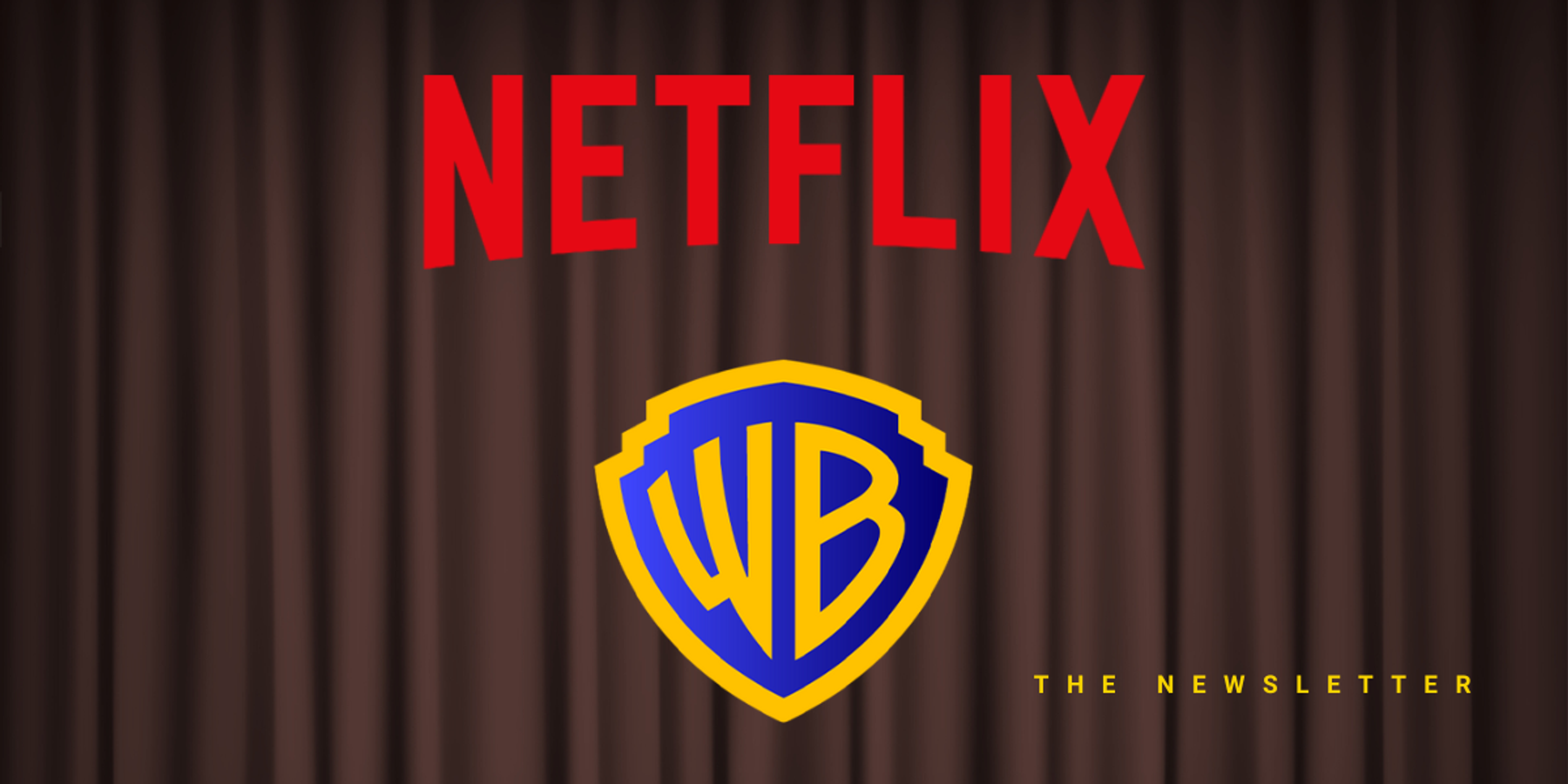🔦 Spotlight
Hello Los Angeles!
In a week where everyone was already arguing about what “the future of entertainment” is supposed to look like, Netflix decided to skip the debate and buy a giant piece of the past and, possibly, the future. Netflix announced a definitive agreement to acquire Warner Bros. Discovery’s Studios and Streaming business, including Warner Bros. film and television studios plus HBO and HBO Max. This is not just another media merger. It is a power transfer, from the studio era where the gatekeepers were greenlight committees to the platform era where the gatekeepers are subscriber relationships, home screens, and retention math.
Here are the bones of the deal. WBD shareholders would receive $27.75 per share, made up of $23.25 in cash and $4.50 in Netflix stock, with the stock portion subject to a symmetrical collar. Netflix puts the transaction at roughly $72 billion in equity value and $82.7 billion in enterprise value, and expects it to close in 12 to 18 months, but only after WBD completes its planned separation of its Global Networks business into Discovery Global, now expected in Q3 2026.
Now zoom in on why this matters in Los Angeles specifically.
LA’s creative engine is about to be run by a single, very efficient distribution machine
Warner Bros. is not just a studio. It is an institutional muscle memory for how to develop, package, and produce at scale, plus a library and franchises that can carry a business through multiple economic cycles. Netflix is not just a distributor. It is the largest direct to consumer entertainment subscription platform on earth, built around global reach, product iteration, and data feedback loops. Put them together and you get a company that can create, market, distribute, and monetize premium entertainment without needing anyone else’s permission.
That will sound exciting to some creators and terrifying to others, often for the same reason. When the same entity owns the audience relationship and the content factory, it can take bigger swings because it has more margin for error. It can also take fewer swings because it does not need to. The incentive shifts from “What is culturally important?” to “What makes people stay?” Those are sometimes the same question. Sometimes they are not.
This deal won’t be decided in a writers’ room. It’ll be decided by regulators.
This is exactly the type of consolidation regulators have been itching to interrogate. A combined Netflix plus HBO Max instantly raises questions about market power, competition, and pricing, plus downstream effects on theaters, independent studios, and negotiating leverage with talent. Even if Netflix vows to maintain current operations and keep the consumer experience strong, the political story is straightforward: fewer giant buyers typically means less bargaining power for everyone who sells into the system.
Also worth noting, Reuters reports a termination fee of $5.8 billion under certain circumstances, which tells you both sides are bracing for a drawn out, high scrutiny process.
The quiet subtext: the bundle is coming back, just wearing a streaming hoodie
Netflix will almost certainly pitch this as more choice and better value. Regulators will hear less competition. Consumers will hear how much is this going to cost me. The most plausible end state is not a single mega app on day one. It is a reimagined bundle: separate brands, packaged pricing, shared sign on, cross promotion, and eventually tighter integration if the politics and churn math allow it.
The real disruption is not whether HBO Max keeps its name. It is whether Netflix becomes the default front door to premium scripted entertainment globally.
🤝 Venture Deals
LA Companies
- Castelion, a Torrance based defense technology startup, raised a $350M Series B round led by Altimeter Capital and Lightspeed Venture Partners, with participation from investors including Andreessen Horowitz, General Catalyst, Lavrock Ventures, Space VC, Avenir and Interlagos Capital. The money will be used to scale production of its Blackbeard hypersonic weapon, stand up its Project Ranger manufacturing campus in New Mexico, and support multiservice testing and integration with U.S. Army and Navy platforms starting in 2026. - learn more
- Antares announced a $96M Series B to accelerate an iterative “build, test, iterate” approach to developing nuclear reactors quickly, with the funding going toward hardware and subsystem testing, fuel fabrication, manufacturing, and the infrastructure to turn on a reactor. The company says it plans a low-power “Mark-0” reactor demonstration in 2026 at Idaho National Laboratory, with a pathway to a full-power electricity-producing reactor as early as 2027 and a commercial prototype microreactor (“Mark-1”) after the Mark-0 milestone. - learn more
LA Venture Funds
- With FirstLook Partners participating, Flex raised a $60M Series B led by Portage, bringing its total equity raised to $105M to build an AI native finance platform for middle market business owners. The company says it will use the new funding to accelerate product expansion and scale its AI agent infrastructure across areas like private credit, business finance, personal finance, payments, and ERP. - learn more
- Led by MTech Capital, Curvestone AI raised a $4M seed round with participation from Boost Capital Partners, D2 Fund, and Portfolio Ventures to scale its AI automation platform for regulated industries like financial services, legal, and insurance. The company says it’s tackling the “compound error” problem that makes multi step AI workflows unreliable, and will use the funding to accelerate product development and go to market expansion. - learn more
- Co-led by CIV, Unlimited Industries raised a $12M seed round (alongside Andreessen Horowitz) to scale its “AI-native construction” approach to designing and building major infrastructure projects. The company says its platform can generate and evaluate massive numbers of design configurations to optimize for cost, safety, and performance, cutting pre-construction engineering timelines from months to weeks, and it is initially focusing on projects that rapidly expand U.S. power capacity for things like data centers, critical minerals, and advanced manufacturing. - learn more
- With Hyperion Capital participating (alongside Amplify Venture Partners, Spark Capital, Tamarack Global and others), Antithesis raised a $105M Series A led by Jane Street, which is both an investor and an existing customer. The company says it will use the capital to accelerate its deterministic simulation testing platform and scale go to market efforts across North America, Europe, and Asia, positioning the product as “critical infrastructure” for teams running complex distributed systems. - learn more
- With XO Ventures participating, Orq.ai raised an oversubscribed €5M seed round led by seed + speed Ventures and Galion.exe to help enterprises build, deploy, and manage production grade AI agents with stronger control over data, behavior, and compliance. The company says the funding will accelerate expansion of its platform, including its newly launched Agent Studio and managed runtime, as it pushes to close the “AI production gap” for companies moving beyond demos into real deployment. - learn more
- Untapped Ventures participated in Lemurian Labs’ oversubscribed $28M Series A, co-led by Pebblebed Ventures and Hexagon, as the company builds a software-first platform designed to run AI workloads efficiently across any hardware and across edge, cloud, and on-prem environments. Lemurian says the funding will help it expand engineering, accelerate product development, and deepen ecosystem collaborations aimed at reducing vendor lock in and infrastructure costs. - learn more
- Fifth Wall and Park Rangers Capital participated in Ridley’s $6.4M seed round, which Fifth Wall led, backing the company’s push to rebuild the real estate process around consumers with fewer commission-heavy frictions. Ridley says the capital will help launch an AI-powered buy-side experience that surfaces private, for-sale, and “soon-to-be-listed” homes using predictive analytics, while also expanding its commission-free seller tools and “Preferred Agents” network for on-demand support. - learn more
- Anthos Capital participated in Kalshi’s $1B Series E at an $11B valuation, a round led by Paradigm with other backers including Sequoia, Andreessen Horowitz, Meritech, IVP, ARK Invest, CapitalG, and Y Combinator. Kalshi says its trading volume now exceeds $1B per week across 3,500+ markets, and it will use the new capital to accelerate consumer adoption, integrate more brokerages, strike news partnerships, and expand product offerings. - learn more
Download the dot.LA App







 Image Source: Perelel
Image Source: Perelel